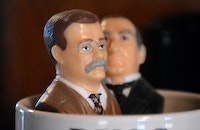Many Frenchmen were addicted to coffee, but Voltaire’s coffee obsession was one of the most enthusiastic of the eighteenth century. Perhaps his extraordinary desire for coffee occurred because of what some people claimed were its extraordinary benefits. Many people reported that he drank an inordinate amount of coffee each day, yet despite his obvious overindulgence in the aromatic drink, he praised moderation declaring, “Use, do not abuse; neither abstinence nor excess renders man happy.”
During Voltaire’s time, there were numerous debates and discussions about the effects of coffee and whether it was good or bad for a person. One assessment of coffee that praised it stated:
“Coffee fortifies the Stomach and Brain, promotes Digestion, allays the Head-ach, suppresses the Fumes caused by Wine, and other spirituous Liquors; promotes Urine and Womens Terms, opens some Peoples Bodies, makes the memory and Fancy more quick, and People brisk that drink it: This last Effect has been observed, say they, by the Shepherds of Africa, who took Notice, that before Coffee was used, and that their Sheep fed upon this Kind of Pulse, that they skipped about strangely.”
Another assessment pointed out both the good and the bad:
“It is certain that coffee, ‘that intellectual drink,’ as it was well named at this period, has a direct action on the cerebral mass, as is well attested by physiology, and confirmed by the example of celebrated men who have used or abused this drink. All the world, we mean all those who have partaken of true coffee, have observed the effects of this liquid on themselves. On taking this drink one feels the sentiment of well being and hope; melancholy is dissipated; one feels capable of doing, because of a condition of strength. Coffee is truly a brain stimulant. Under its influence conception is clearer and animation more prompt. Imagination does not appear to be put in motion, while memory and the will are mostly benefited by this cerebral disturbance. For some coffee is a poison that acts upon the central nervous system; more particularly upon the cerebral lobes … It acts then in the manner of alcohol, but in an inverse sense. Alcohol and opium produce congestion of the brain. Coffee determines, to the contrary, an anaemia of that organ. Still this theory is far from being absolutely proved.”[3]
Voltaire probably felt some of these “intellectual” effects as he reportedly drank coffee non-stop. One person claimed Voltaire’s coffee obsession began as early as five o’clock in the morning and lasted until three o’clock in the afternoon. Another person reported that he drank it continually and never stopped. Voltaire also known to drink coffee wherever he went out for the evening, and in January of 1748, when he was in Paris it was reported:
“He dined in Paris that night at a coffee-house, with a few other literary men. He arrived rather late. He had come straight from Versailles, and alone of the company knew what had occurred there. He made his dinner, after his frugal fashion, off seven or eight cups of black coffee and a couple of rolls, and was very talkative and amusing.”[4]
Because of Voltaire’s coffee obsession he was also willing to pay exhortation amounts to import it, which at the time was considered an eccentric act. Moreover, unlike Napoleon Bonaparte who drank his coffee black, Voltaire tended to mix his coffee with a little bit of tasty chocolate.
In the early to mid-1700s, chocolate was a luxury item and only the rich could afford it. However, plenty people clamored for chocolate beside Voltaire. Marie Antoinette loved it enough that she hired her own personal chocolate maker and often drank it in the morning. There was also the Princesse de Lamballe. She and her family were painted drinking chocolate in J.B. Charpentier’s “Cup of Hot Chocolate.”

Portrait by J. B. Charpentier of the Duke of Penthièvre, his son Prince de Lamballe, the Princesse de Lamballe, daughter (the future Duchesse d’Orleans), and the Countess Toulouse drinking chocolate. Public domain.
The French were a coffee-loving nation, which resulted in a number of coffee shops. One of Voltaire’s favorite places to consume the black stuff was at the Café Procope in Paris. This cafe was the Parisian hot spot for all the 18th century Encyclopédistes, intellectuals, and scandal-gossip writers. Besides French patrons, there were many foreign people who visited the cafe, including Benjamin Franklin, Thomas Jefferson, and John Paul Jones. Read More.




